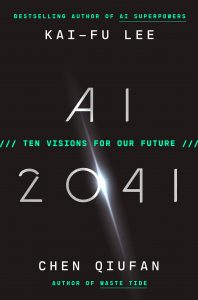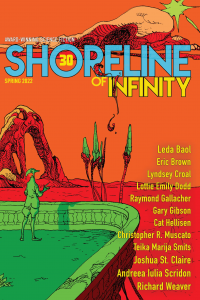Gary K. Wolfe Reviews AI 2041: Ten Visions for Our Future by Kai-Fu Lee & Chen Qiufan
 AI 2041: Ten Visions for Our Future, Kai-Fu Lee & Chen Qiufan (Currency 978-0-593-23829-5, $30.00, 452pp, hc) September 2021.
AI 2041: Ten Visions for Our Future, Kai-Fu Lee & Chen Qiufan (Currency 978-0-593-23829-5, $30.00, 452pp, hc) September 2021.
I’ve generally been skeptical of efforts to match up SF stories with ‘‘science fact’’ essays, partly because ‘‘science fact’’ has always seemed a redundant back-formation that no one would use at all, if it weren’t for the supposed need to remind us that science fiction is, well, fiction. (Most of us have that all figured out.) But there are a number of factors that make Kai-Fu Lee & Chen Qiufan’s AI 2041: Ten Visions for Our Future both enjoyable and enlightening. One is that Lee, an advocate of AI and former executive at Apple, Google, and Microsoft, proves to be a lively and skilled popular science writer, while Chen (whose Waste Tide was reviewed here in April 2019) is among the most prominent of the younger generation of Chinese SF writers. Another is that the collection – ten stories by Chen, each accompanied by a speculative essay from Lee – is rigorously disciplined in its focus. As the title suggests, they have limited themselves to possible AI developments over the next 20 years. Each story and essay focuses on either a specific application – deep learning, neural networks, healthcare, VR, autonomous vehicles, etc. – or a potential area of concern, such as job displacement, privacy, economic disruption, or smart weapons. For his part, Chen is careful to emphasize the worldwide impact of AI by using a wide variety of cultural settings (Nigeria, Korea, India, China, Japan, Qatar, Sri Lanka, Australia, Europe, Iceland, the US.)
Facing such self-imposed constraints, Chen’s stories (written in Chinese, and translated by four skilled translators) almost serve as case studies in what science fiction can do that ‘‘science fact’’ can’t. Where Lee writes about issues, Chen writes about characters. Where Lee writes about potential, Chen uncovers potential problems (though Lee is quick to acknowledge such problems in afterwords to the stories). In the lead story, for example, ‘‘The Golden Elephant’’, set in Mumbai, an AI-driven insurance program designed to maximize healthful behavior grows increasingly intrusive, monitoring the data streams of family members – especially the teenage daughter – and continually adjusting premiums to enforce compliance. For Lee, this becomes an object lesson in how deep-learning AIs might become too single-minded in enforcing a narrow set of protocols. The contrasting roles of AI tutors in the growing rivalry between Korean orphan twins in ‘‘Twin Sparrows’’ prompts Lee to discuss natural language processing, which he expects to grow explosively over the next several years. In other cases, though, Chen’s storytelling instincts get the best of him. ‘‘The Holy Driver’’ leads into Lee’s discussion of the benefits of autonomous vehicles, but the story itself involves a young Sri Lankan, who learns to be a ‘‘ghost driver’’ of remote vehicles, at one point taking over such a vehicle from its AI and foiling a terrorist attack through maneuvers that are no more high-tech than a Fast and Furious movie chase.
While much of AI 2041 seems designed to celebrate the possibilities of AI in a wide variety of applications, both Chen and Lee also seem eager to let us know that they’re aware of its limitations as well. An Arab magnate’s efforts to create an ‘‘Isle of Happiness’’ for select clients only demonstrates the difficulty of quantifying notions like happiness, while the main character in ‘‘The Job Savior’’ (set in the US) works for an ‘‘occupation restoration company,’’ assisting displaced workers after an experiment in guaranteed basic income fails (both Lee and Chen seem skeptical about that idea). The final story, ‘‘Dreaming of Plenitude’’, is also one of the best, exploring the possibilities of a post-scarcity economy and a currency based on community service and reputation, but – as is frequently the case – the story’s strength derives entirely from its characters, in this case a caregiver in Australia working with an aging environmental scientist in the early stages of Alzheimer’s. While, on occasion, Chen’s scenarios lead him into abstract exposition almost indistinguishable from Lee’s commentary, at his best his characters emerge as sympathetic and credible denizens of futures that are as daunting to them as they seem to us.
Gary K. Wolfe is Emeritus Professor of Humanities at Roosevelt University and a reviewer for Locus magazine since 1991. His reviews have been collected in Soundings (BSFA Award 2006; Hugo nominee), Bearings (Hugo nominee 2011), and Sightings (2011), and his Evaporating Genres: Essays on Fantastic Literature (Wesleyan) received the Locus Award in 2012. Earlier books include The Known and the Unknown: The Iconography of Science Fiction (Eaton Award, 1981), Harlan Ellison: The Edge of Forever (with Ellen Weil, 2002), and David Lindsay (1982). For the Library of America, he edited American Science Fiction: Nine Classic Novels of the 1950s in 2012, with a similar set for the 1960s forthcoming. He has received the Pilgrim Award from the Science Fiction Research Association, the Distinguished Scholarship Award from the International Association for the Fantastic in the Arts, and a Special World Fantasy Award for criticism. His 24-lecture series How Great Science Fiction Works appeared from The Great Courses in 2016. He has received six Hugo nominations, two for his reviews collections and four for The Coode Street Podcast, which he has co-hosted with Jonathan Strahan for more than 300 episodes. He lives in Chicago.
This review and more like it in the January 2022 issue of Locus.
 While you are here, please take a moment to support Locus with a one-time or recurring donation. We rely on reader donations to keep the magazine and site going, and would like to keep the site paywall free, but WE NEED YOUR FINANCIAL SUPPORT to continue quality coverage of the science fiction and fantasy field.
While you are here, please take a moment to support Locus with a one-time or recurring donation. We rely on reader donations to keep the magazine and site going, and would like to keep the site paywall free, but WE NEED YOUR FINANCIAL SUPPORT to continue quality coverage of the science fiction and fantasy field.
©Locus Magazine. Copyrighted material may not be republished without permission of LSFF.






